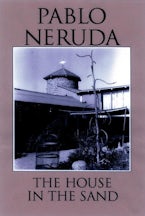Pablo Neruda (1904-1973) held diplomatic posts in Asian and European countries. After joining the Communist Party, Neruda was elected to the Chilean Senate but was forced to live in exile in Mexico for several years. Eventually he established a permanent home on Isla Negra. In 1970 he was appointed as Chile's ambassador to France; in 1971 he was awarded the Nobel Prize in Literature.
Tomás Q. Morín: Tomás Q. Morín was born in Texas and educated at Texas State University and Johns Hopkins University. He is the recipient of scholarships from the Fine Arts Work Center, Bread Loaf Writer’s Conference, and the New York State Summer Writers Institute. His debut volume of poetry, A Larger Country, won the APR/Honickman First Book Prize. He lives in San Marcos, Texas, and teaches at Texas State University.
Born in Argentina in 1942, ARIEL DORFMAN spent ten years as a child in New York, until his family was forced out of the United States by the persecution of McCarthy. The Dorfmans ended up in Chile, where Ariel spent his adolescence and youth, living through the Allende revolution and the subsequent resistance inside Chile, and abroad after the dictatorship that overthrew Allende in 1973. Accompanied by the love of his life, Angélica, to whom he has been married for over fifty years, he wandered the globe as an exile, finally settling down in the United States, where he is now Walter Hines Emeritus Professor of Literature at Duke University, though he keeps a house in Chile where he and Angelica travel frequently. They are blessed with a large family and many dear friends. Dorfman’s acclaimed work (which includes the play and film Death and the Maiden and the classic text about cultural imperialism, How to Read Donald Duck) covers almost every genre available (plays, novels, short stories, fiction, essays, journalism, opinion pieces, memoirs, screenplays). In all them, he has won major awards, leading to accolades from Time ("a literary grandmaster"), Newsweek ("one of the greatest novelists coming out of Latin America"), the Washington Post ("a world novelist of the first order") and the New York Times ("he has written movingly and often brilliantly of the cultural dislocations and political fractures of his dual heritage").

